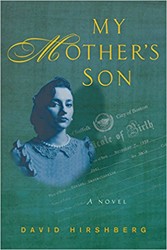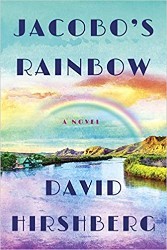
David Hirshberg, author of My Mother’s Son, is writing here as part of Jewish Book Council’s Visiting Scribe series.
Moments after my father would beat me, my mother would enter my room as if on cue, and go through the motions of pretending that we were still a family. “Your father doesn’t mean to hurt you,” she’d say, rubbing the top of my shoulders with her open palm, ignoring the beet-hot stain on my rear or the impression of his belt buckle on my legs. By the age of 5, I knew her speech, and I had to restrain myself from getting ahead of her lines, lest my father would reenter and wash my mouth out with soap. He tailored his punishments to my offenses — soap for what he didn’t like to hear, hitting for a rule violation, the belt for resistance. Yes, I was guilty: of not instantly jumping out of my chair to take out the garbage; of saying ‘in a minute’ to a command only to have the French door to my room kicked in with force as he bellowed out the seconds past sixty; of being, well, a kid.
He was all business when handing out corporal punishment. His face would become flushed and taut, his eyes would fix upon the target, and then his arms and legs would whirl like a windmill, powered by the gears of rage. It was only during these episodes that I received his undivided attention. While he was good with physical punishment, he was outstanding in his capability to crush my spirit with an attack upon my character, my performance or my demeanor. Most of the time this was done at the time of a triumph, in a sports contest, a school event, or an activity such as Scouts.
He had no shame. He’d explode when some hidden fuse would ignite and if it happened to be when a friend was around or another family member was present, it didn’t seem to have an effect on him. I used to dream that mirrors filled every inch of our walls and that when he’d catch a glimpse of himself in one of his rages that he’d stop, abruptly, and approach the mirror with that look of curiosity, doubt and consternation that animals do when they see their own image.
My father loved other people’s children. If we were at a restaurant, he would align his chair in such a way as to be in the direct line of sight of a kid at another table, and he would make faces, hand signals, laugh, and coo, all the while ignoring us completely. By the end of the meal, his chair would be turned completely away from us, as he basked in the compliments and smiles from the other children and their parents. On their way out, they’d invariably stop by our table to tell me how lucky I was to have a father such as this.
One day, the mother of one of my gentile friends asked me a lot of questions, about my situation⎯that’s what she called it⎯designed to tease out if my father’s behavior was typical or aberrant with ‘your people’, the delicate phrase she used that had no meaning to me at that time. Perhaps this was meant to be the start of an intervention dance; if it was, it had no second step.
During the summer of my sophomore year at college, my father came up from behind me and kicked me in the calf, yelling about something I couldn’t understand. I turned and clocked him hard on the chin. He tumbled down by the force of the blow, stunned by my reaction, and in that instant of physical superiority, I seized the moment to lean over him and to tell him, in a surprisingly clear and confident voice, that if he ever, ever, did anything like that to me again, I’d make him pay for it forever.
I saw my father only occasionally in his last forty years.
I never knew the why of it all, and wondered if it were the result of some trauma he faced as the first Jew born in the United States to parents who spoke no English or, perhaps equally likely, that the origin was something related to genetics or a random ordeal that was either real or imagined.
Upon reflection, despite the physical and mental abuse, despite never having heard a kind or loving comment from him, never having had a hug, not even a touch from him, I was, in a strange way, more fortunate than most. Oh, I didn’t think so when I was a child and even as a young man, but as an adult who is now ‘of a certain age’, I have a different perspective. Don’t get me wrong, I’m not saying I wish other kids had a father like this. Heaven forbid. No. But if you look at it through a prism that breaks down life into its component parts, then I had the opportunity, starting at a very young age, to understand what not to do, how not to behave, how to steel myself against disappointments, how to stop and think about something and make sure that I’d do the opposite of what he’d have done. It’s an unusual gift I got and I’ve made sure that it’ll never be returned.
David Hirshberg is the author of the multiple-award-winning debut novel My Mother’s Son and has published three short stories: Gift, Tikkun Olam, and Precious Moments. He holds an undergraduate degree from Dartmouth College and a master’s degree from the University of Pennsylvania. He lives with his wife and two setters in Westchester County, New York.

